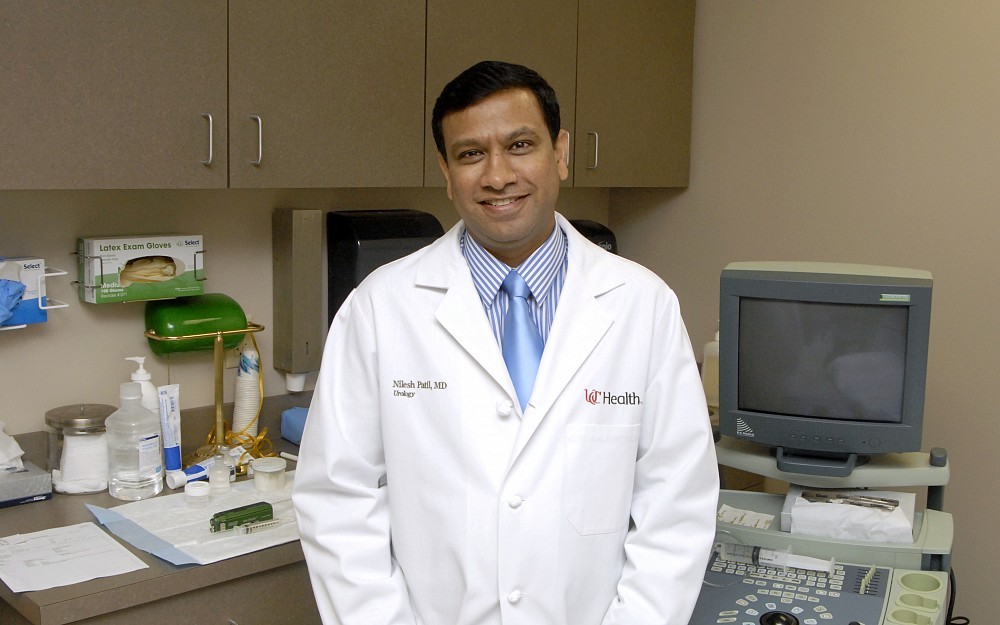
Minimally Invasive Prostate Cancer Surgery Reduces Patient s Concerns
When Charles Andrews, 55, of Mason, was diagnosed in April 2011 with localized prostate cancer, trusted advice gained by word of mouth brought him to the office of UC Health urologist and surgeon Nilesh Patil, MD.
Andrews had localized prostate cancer and he knew he had options for treatment, but felt a bit daunted by the choice. He began asking his family, friends and co-workers for recommendations. It was his coworkers sisterwho also happened to be an old friend of Andrews and nurse in West Chesterwho connected him with Patil.
"I felt extremely comfortable with Dr. Patil from the beginning. He gave me his cell phone number, was quick to answer my questions and very specific about what to expect before, during and after the surgery, recalls Andrews. "He encouraged me to interview multiple surgeons before I chose him. I did, but Dr. Patil was the right surgeon for me.
The Catheter-Less Prostatectomy Approach
Through Patil, UC Health is one of two health care systems in the United States and the first in Ohio to offer robot-assisted prostate cancer surgery (prostatectomy) without the need for a penile catheter post-op. Studies have shown that almost 80 percent of patients are severely bothered by the presence of a catheter after surgery.
The no catheter technique involves draining urine directly from the bladder through a small incision above the pubic bone via a small tube after surgery. This spares the patient of the irritation of a penile catheter during recovery and allows for early bladder training. In traditional prostate cancer surgery, patients have a penile catheter for up to seven to10 days to drain urine while the surgical site heals.
"Patients experience less pain with this technique and the outcomes are no different when the surgery is performed at experienced medical centers like UC Health, adds Patil, who also serves as an associate professor of surgery at the UC College of Medicine and director of robotic services (urology).
Andrews, who is a middle school history teacher and sports coach, says this catheter-less approach addressed his chief fear about prostate cancer surgery: post-surgery bladder control.
"I coach high school baseball; wearing bladder protection wasnt an option for me. Dr. Patil assured me regaining bladder control wouldnt be much of a problem, and he was right, says Andrews. "Two weeks after surgery, I had complete control back. It was a huge relief.
Andrews underwent the robot-assisted catheter-less prostatectomy at UC Health University Hospital on June 2, 2011. A year later, he remains cancer free and says he has a great quality of life.
More Information
For more information on the UC Health multidisciplinary prostate cancer team, visit cancer.uc.edu.
For appointments with urology, call 513-475-8787.
For appointments with hematology oncology, call 513-584-8500.
For appointments with radiation oncology, call 513-584-4775.

Charles Andrews had a catheter-less prostatectomy with Nilesh Patil, MD.
Related Stories
Ohio could soon make breast cancer screenings more affordable
May 9, 2025
The University of Cincinnati Cancer Center's Ann Brown was featured in Local 12 and Cincinnati Enquirer reports on a bill introduced by Rep. Jean Schmidt in the Ohio legislature that seeks to eliminate out of pocket medical expenses such as copays and deductibles associated with supplemental breast cancer screenings.
Preparing students for artificial intelligence in education
May 8, 2025
Laurah Turner, PhD, associate dean for artificial intelligence and educational informatics at the University of Cincinnati's College of Medicine, recently joined the For The Love of EdTech podcast to discuss the usage of personalized learning and AI coaches to enhance educational experiences.
UC lab-on-a-chip devices take public health into home
May 8, 2025
University of Cincinnati engineers created a new device to help doctors diagnose depression and anxiety. The “lab-on-a-chip” device measures the stress hormone cortisol from a patient’s saliva. Knowing if a patient has elevated stress hormones can provide useful diagnostic information even if patients do not report feelings of anxiety, stress or depression in a standard mental health questionnaire.
